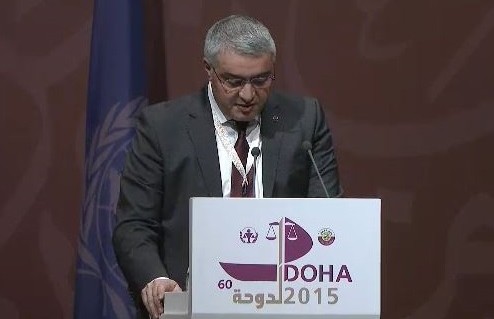13th Crime Congress (Doha, 2015), High level segment, 5th Plenary Meeting
Statement by H.E. Mr. Ashot Hovakimyan,
Deputy Minister of Foreign Affairs of the Republic of Armenia at the 13th United Nations Crime Prevention and Criminal Justice Congress
Doha, 13 April, 2015
Mr. President,
I would like to thank the Qatari Government for hosting the Thirteenth United Nations Congress on Crime Prevention and Criminal Justice.
Obviously, 2015 is the year, when any single important international gathering is obliged to bring an added value to whole concept of Sustainable Development, the main topic of this Congress.
The Congresses on crime prevention and criminal justice made unique and important contributions to the law and policy development, the identification of emerging trends and issues in crime prevention and criminal justice. Regrettably, despite all significant achievements on national and international levels to develop effective, fair, humane and accountable criminal justice systems and institutions, in many parts of the world human beings are deprived of protection and persecuted by those who are motivated by hatred and intolerance. Unfortunately, despite the congresses and the declarations, despite the international conventions and other documents, the denial and the impunity for the most serious crime against humankind – the crime of genocide still needs to be addressed.
Mr. President,
It was exactly one hundred years ago the three countries who are currently Permanent members of the Security Council characterized the Armenian massacres as “crime against humanity and civilization”.
Regrettably, we have to confess, that the use of this term becomes relevant in the current realities as well. The concentrated attempts of terrorist groups including foreign terrorist fighters to deprive religious and ethnic groups of their life, property, religion, culture and memory can be indeed qualified as crime against humanity and civilization.
The full implementation of the UN SC resolution 2170, 2178 and 2199 is essential in prevention of massive and grave human rights violations against religious and ethnic groups. Armenia as a nation who survived in 1915 the first genocide of 20th century, the Centennial of which would be commemorated in ten days, has moral responsibility towards the protection of collective and individual rights of the religious and ethnic groups and their members particularly in the situation where their survival is at stake.
Genocide prevention is a high priority for Armenia. Throughout recent years we have tried mainstream issues of genocide prevention in international cooperation on security and human rights. We are glad that 2 weeks ago the Human Rights Council unanimously adopted an important resolution on Genocide prevention, sponsored by Armenia and co-sponsored by 70 states. The resolution manifests the growing consensus of international community to address impunity and denial of grave and massive human rights violations. We are destined to demonstrate our universal human solidarity to the victims of those crimes and punish perpetrators of mass atrocities under universal jurisdiction.
Mr. President,
It is obvious, that impunity is breeding ground for new crimes. Nowadays we are facing contemporary, technologically sophisticated crimes, one of them – the cyber crime.
Armenian citizens are free in their access to the global web, therefore we are sharing all the consequences of that freedom with other nations and very often we are subject for cyber attacks and hackings. Armenia shares the opinion of those, who is in favor of regulations aimed at the cyber security in conformity with all human rights.
International cooperation is key to success in addressing global treats since borders of national responsibility are becoming blurred. Armenia is closely cooperation within the framework of the OSCE and Council of Europe in mainstreaming regional instruments into its domestic legislation.
Another ugly phenomenon of the present days is the modern days slavery manifested mostly through trafficking in human beings and human organs. Armenia has achieved significant result in fighting trafficking in human beings.
The National Criminal Code has been revised and today the penalty for traffickers is proportional to the crime they have committed.
Last December Armenia adopted a new law «On Identification of and Support to Persons Subjected to Trafficking in Human Beings and Exploitation» that took into consideration a number of recommendations submitted by international organizations and experts.
See the video here.

About the author